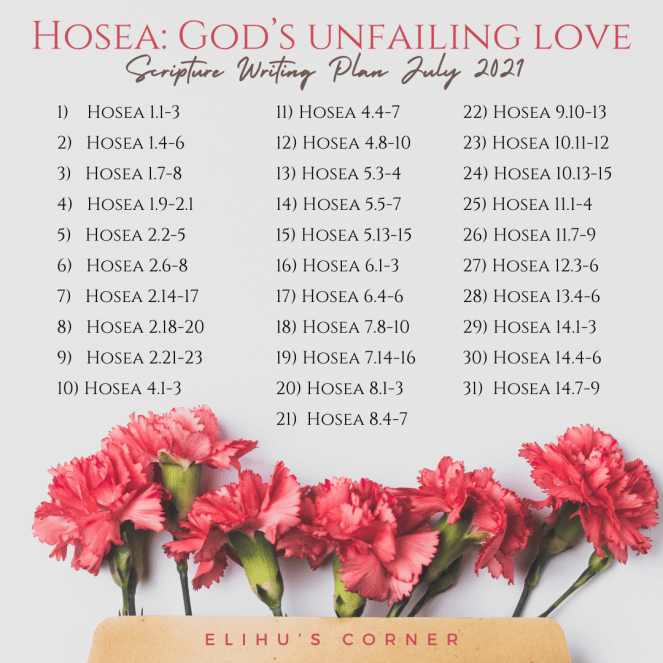
“Come, let us return to the Lord;
Hosea 6.1,3
for he has torn us, that he may heal us…
Let us know; let us press on to know the Lord;
His going out is sure as the dawn;
He will come to us as the showers,
As the spring rains that water the earth.”
Could you continue to love someone who had rejected, betrayed, and/or abandoned you?
As Christians, we know that we are supposed to love those who hurt us, but it is far easier said than done. Personally, I find it hard to love to people who betray me; I tend to treat them with civility and/or avoidance.
It is God who calls us to “love those who spitefully use you and persecute you,” yet He does not ask us to do more than He Himself has done.
Consider your own past. Have you ever denied God (or hidden your allegiance to Him) in order to fit in with the crowd, keep your job, or pass a test? Have you ever chosen someone or something over Him? Have you ever ignored His commandments because they were too difficult?
If we are being honest, I think most of us could answer yes to one or all of those questions, which means that at some point we have been disloyal to the Lord.
Even so, God does not stop loving us. He beckons us to return to Him and be faithful.
In the book of Hosea, the prophet illustrates Israel’s faithlessness and God’s unfailing love through his own life experience. He marries Gomer, a prostitute, who bears Him children, but then returns to her life of prostitution. Hosea, at the command of the Lord, redeems her, and loves her, again.
Israel’s idolatry was much like a faithless wife given to adultery and prostitution. Throughout the text, God condemns their hypocrisy and impurity.
Do not be deceived. We can fall into similar traps if we do not keep close to Christ.
Hosea is categorized as one of the “minor prophets,” not because they are less important but because of the size of the books. He prophesied around the same time period as Micah, Amos, and Isaiah. Most scholars have concluded that He prophesied for around 70 years against Israel and Judah.
One thing I found interesting is the significance of names in this book. Check out this note from Barnes’ commentary:

It is also interesting that Hosea, Yeshua, and Joshua are all from the same root word, yet Yeshua and Joshua mean God is Salvation.” The Israelites will only receive the salvation offered by God if they return to Him. (This is noted in multiple commentaries.)
Even the names of Hosea’s children are significant—“Jezreel,” “Lo-Ruhamah,” and “Lo-Ammi” mean “God Scatters,” “Not Pitied,” and “Not My People.” These names seem dark and sad, yet God will redeem each of these things!
You’ll also notice that Ephraim is mentioned multiple times throughout the text. At this point in history, the Israelites are divided into the northern kingdom (Israel) and the southern kingdom (Judah). Ephraim was one of the largest tribes in the northern kingdom of Israel. His name also means “fruitfulness” and God was removing the “fruitfulness” of Israel because of their repeated faithlessness.
I hope some of these notes will help you as you write through the text. The minor prophets have rich messages for us, especially as they point to the coming of Jesus, who brings us salvation.
To download a copy of the plan, click the link below:
To download printables for your littlest scripture writers, click the links below:
If you are new to scripture writing, check out this post: How to Use Scripture Writing Plans
Side note on commentaries: I typically don’t use a commentary until after I have read through a passage or book multiple times and even then, I will do side by side comparisons with other Bible versions first. Be careful not to take what a commentary says as a hard and fast rule, because these are observations made by writers who could be mistaken in their conclusions. Commentaries are helpful for finding out things like historical context, definitions of Hebrew or Greek words, and sometimes cross-reference connections, but their interpretation of a text should be secondary to the Bible itself. Always look to God’s word first!
If you have any questions or comments, please type below! Be sure to visit our social media pages—Facebook and Instagram for daily posts on this month’s plan!

TY
LikeLiked by 1 person